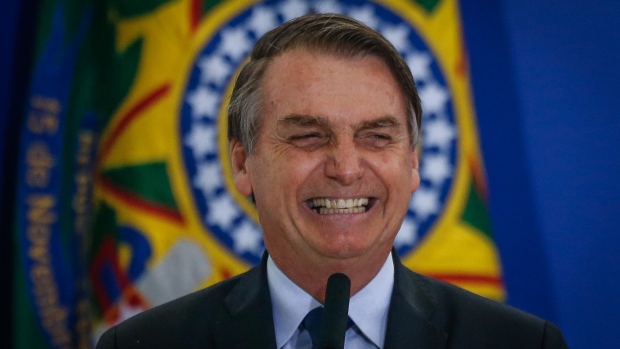May 26, 2019
Brazilians Rally to Back Bolsonaro After Protests Erode Support
, Bloomberg News

(Bloomberg) -- Demonstrators gathered in Brazil’s major cities on Sunday to show support for President Jair Bolsonaro and his planned revamp of social security after a series of opposition protests eroded his popularity.
Rallies planned in more than 350 cities including the capital, Brasilia, and Rio de Janeiro will be closely watched as a gauge of Bolsonaro’s support after five tumultuous months in power. Crowds wearing yellow and green -- the colors of Brazil’s flag -- began forming about 9 a.m. local time with the biggest rally expected later Sunday in Sao Paulo.
The former congressman won more than 57 million votes after a campaign that took a hard-line against crime and pledged to revive the economy. In recent weeks, Bolsonaro has faced massive street protests against his policies, a sharp decline in approval ratings and rising opposition in Congress.
“If the demonstrations indicate a good level of support for the government’s reforms, then financial markets would see that as positive,” Mauricio Oreng, a Brazil senior strategist at Rabobank, said in describing a “tense political environment” in Brazil. “Any disturbances or more radical messages would be viewed negatively."
Administration officials are split over the demonstrations. One group expects throngs of voters eager to reaffirm the ex-Army captain’s decisive victory in October, while another fears a show of frustration with his government. Even though the president initially endorsed the idea, neither he nor any of his ministers are expected to take part. Speaking on Sunday, Bolsonaro called the acts "spontaneous."
Members of Bolsonaro’s party, the PSL, are also torn. Government allies, such as the libertarian pressure group MBL and the Partido Novo, will not participate amid concerns the rallies may also feature messages against institutions such as the legislature and the judiciary.
“We will not sign up to demands to close Congress or the Supreme Court or the rest of this anti-liberal agenda,” said Kim Kataguiri, a lawmaker from the center-right DEM party and one of the founders of the MBL. “We reject the demonization of parliament, the unwillingness to negotiate with deputies and the use of blogs and children to attack those who disagree.”
Frequent Demonstrations
Political demonstrations have become increasingly common in Brazil since massive protests broke out in 2013 over a sputtering economy and high-profile cases of corruption. However, it is rare for an administration to call its supporters to the streets.
In 1992, then-President Fernando Collor de Mello, weakened by graft allegations and unpopular economic policies, urged supporters to wear yellow and green. But tens of thousands instead wore black in protest.
According to Deysi Cioccari, a political science instructor at the Catholic University of Sao Paulo, calling a demonstration in support of a five-month old administration shows “a certain desperation” for approval.
“For some allies of Bolsonaro, the campaign continues," Cioccari said. "The election was a paradigm shift, but his vote has already been confirmed. What’s missing now is the work to implement the platform on which he was elected."
--With assistance from Josue Leonel and Marisa Castellani.
To contact the reporters on this story: Simone Iglesias in Brasília at spiglesias@bloomberg.net;Samy Adghirni in Brasilia Newsroom at sadghirni@bloomberg.net;Aline Oyamada in Sao Paulo at aoyamada3@bloomberg.net
To contact the editors responsible for this story: Juan Pablo Spinetto at jspinetto@bloomberg.net, Steve Geimann, Nick Lichtenberg
©2019 Bloomberg L.P.







